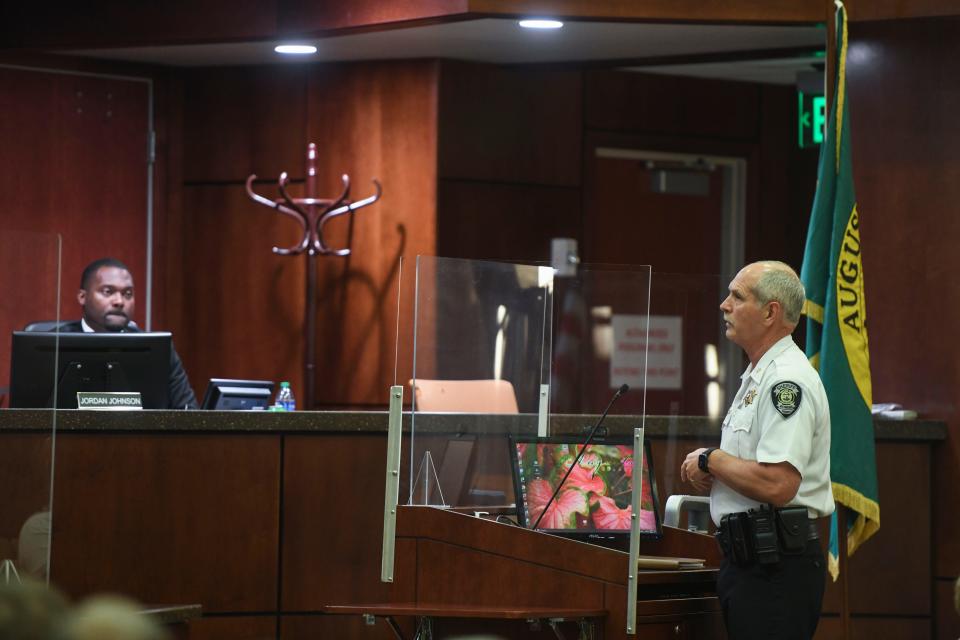When can local governments restrict asking for money in public? Rarely, says lawyer
When does a restriction on asking people for money infringe on a First Amendment right to freedom of speech? That is the question that Augusta commissioners are tackling after being told a Columbia County ordinance on panhandling they were considering as a template is, in fact, unconstitutional.
"Once municipalities get into the business of trying to, you know, criminalize panhandling, almost any panhandling statute is going to be unconstitutional," said Samantha C. Hamilton, Georgia Journalism and Access Project Attorney in the UGA Law First Amendment Clinic.

Asking another person for money is protected the same way any other kind of speech is, Hamilton said. She is currently working on a letter to Columbia County long with the National Homelessness Law Center arguing the unconstitutionality of the law.
Augusta looks to Columbia County for inspiration
Commissioner Sean Frantom brought the Columbia County ordinance to a meeting of the Augusta Public Services Committee, and then to a workshop last week on the proposal. At the workshop, Samuel Meller, senior staff attorney with the law department, said the ordinance violates First Amendment protections on freedom of speech. Commissioners discussed alternatives and will hold another workshop on the subject.
The Columbia County ordinance defines aggressive panhandling as including asking for money again after being turned down, asking for money at night, or asking in a way that could cause bodily harm or a threat of harm, among other things. Columbia County in a statement to the Chronicle disputes that the ordinance is unconstitutional, pointing to a number of courts that have jurisdiction over Columbia County including the Supreme Court and the U.S. Court of Appeals for the 11th Circuit.
"To our knowledge, not a single one of these courts have ruled aggressive panhandling ordinances to be unconstitutional," Columbia County Manager, Scott Johnson, was quoted as saying in the statement.
Hamilton, however, says that Augusta's legal department is correct.
"The Supreme Court case, Reed versus Town of Gilbert was really the landmark Supreme Court case that held that statutes regulating content on signs are content based and are presumptively unconstitutional under the First Amendment," Hamilton said.
Although the 2015 case was not specifically about panhandling, Hamilton said it has been repeatedly held to apply in cases of people asking for money as well. Within the 11th Circuit, which covers Georgia, Alabama and Florida, the precedent goes back to the 1999 Smith v. City of Fort Lauderdale, where a panhandling ordinance was upheld but only because it applied to a very specific part of the city.
Augusta has a similar panhandling ordinance that only applies in specific locations. In 2021, when commissioners considered expanding it, Hamilton joined the National Homelessness Law Center in sending a letter saying such an expansion would be unconstitutional.
"As elected officials we are responsible for making the best decisions for our constituents," Columbia County Commission Chairman Doug Duncan was quoted as saying in the statement. "At the end of the day, you have to do what’s right for the safety and security of your citizens'."
"Really interested in prohibiting that speech"
Many times, Hamilton said, panhandling ordinances prohibit actions — like standing in a roadway or sitting on a sidewalk — while asking for money. But often these actions are already illegal regardless of whether people are asking for money or not.
"When governments enact laws that are duplicative, that add an element of, you know, asking for money, it becomes abundantly clear that the government isn't just interested in prohibiting that conduct, they're really interested in prohibiting that speech," Hamilton said.
Federal courts often find that even laws which are set forward to prevent specific issues, like people being hit by cars, must prove that the issue is already occurring and not just a hypothetical problem, Hamilton said.
If a municipality does pass a likely unconstitutional ordinance, it can choose to repeal the law. But the municipality can also be sued by someone who is cited under the law, or can make a good case they will be cited under it.
"I walk down the street, I hear plenty of things that I really wish I didn't," Hamilton said — catcalling, loud music, political arguments. "...Am I supposed to wave down the nearest cop and say, 'hey, they're making me feel threatened, arrest them?' No, you can't."
Previously on panhandling: To address panhandling in Augusta, officials to hold a workshop, seek an ordinance
This article originally appeared on Augusta Chronicle: Limiting panhandling free speech issue, says UGA expert

